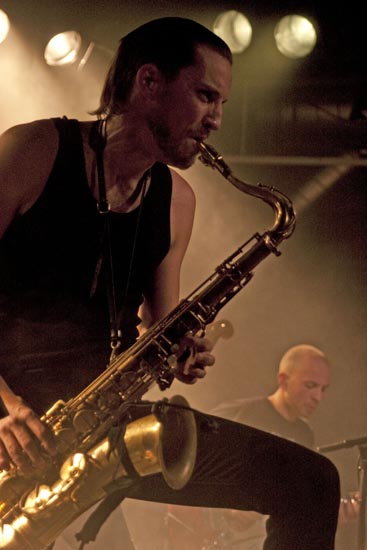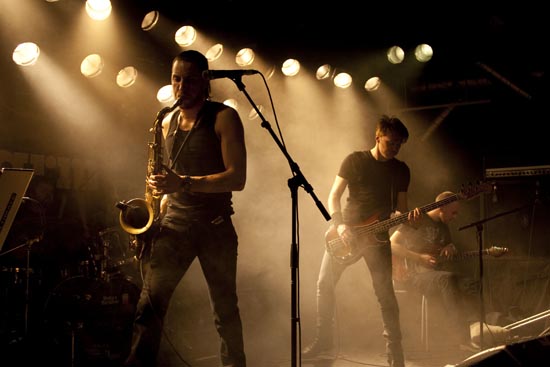All pictures by Maria Jefferis of Shot2Bits.net
Earlier this year the Quietus team had the brilliance of the latest Shining album Blackjazz demonstrated to us in ear-splitting and visceral style. At the fantastic Oslo based conference, by:Larm, in a line-up that included homegrown and Scandinavian pop, dance and rock talent, easily the must-see act of the week was the fifth album by this, latterly berserk, black metal/industrial/free jazz combo. As a pull, they easily outstripped the quirky pop charms of Oh No Ono, the new rave party electro of Datarock, the familiar warmth of Serena Maneesh’s MBV/Sonic Youth inspired post rock or the local multi-instrumental heroism of Jaga Jazzist. Everyone wanted to see the almost obscenely challenging death metal avant jazz industrial noise assault of Shining. The queue outside was several deep and stretched along the side of the John Dee Club and people jockeying for position fell over on the black ice in the scrum to get in. Only simultaneous deployment of a Jedi mind trick, an AAA pass and what should truthfully be termed as some awfully craven begging on bended knee got me and Maria, the photographer into the venue to see the show.
During the gig in a sea of smiling faces with heads bobbing along to a complex, funky, brutal, pile driver heavy riff there are metalheads, dreads, jazz fiends, beard stroking avant sorts and beer chugging indie fans alike. The almost delicately handsome Vincent Gallo lookalike and bandleader Jørgen Munkeby switches between furrow-browed concentration as he lays down hyper-complex jazz metal riffs and a freer style on the saxophone which calls to mind Fred Madison, the saxophonist character that Bill Pullman plays in David Lynch’s Lost Highway. He looks locked in concentration but seems totally at ease on stage. This is as it should be given that he has spent most of his teen and adult life performing jazz, metal or a combination of both.
Munkeby split from his day job as a member of other festival highlights Jaga Jazzist when he was still a teenager over a decade ago to form Shining and they released their debut in 2001. Since then their experiments have pushed them further and further into outlier territory. This is not to say that Shining’s ouevre is without precedence. Elements of their sound can be traced back to Bill Laswell, Fred Frith and Fred Maher’s bleak avant metal project Massacre, to Birmingham industrial grind overlords Godflesh, to Canadian jazz punkers NOMEANSNO circa Why Do They Call Me Mr Happy? and to the New York avant grindcore of John Zorn’s Naked City. And then even further back to King Crimson and Frank Zappa. But this would only give you the vaguest of sketches of how they sound now circa their stunning new album Blackjazz. Add Ornette Coleman, Front 242, Fugazi, Fantomas, Ministry, The Cardiacs and Young Gods into the mix and you’re getting closer.
On stage the frontman divides his time between laying down complicated lead riffs on guitar and ‘shredding’ on saxophone. He uses the latter to great effect on closing track, a cover of King Crimson’s ’21st Century Schizoid Man’, which calls to mind Italian jazz metal trio Zu at their ear drum perforating best before ending on a stop/start noise coda of devastating precision, which then flips to a riff that sounds like Slayer playing the Mission: Impossible theme music.

At the end of what can only really be described as a ludicrously brilliant performance, the ever polite Munkeby says "We’re Shining from Norway; not from Sweden." As someone who has been a metal journalist for the last decade I don’t mind saying that there’s nothing wrong per se with the suicide obsessed goth metallers from the other side of Scandinavia but when all’s said and done, they aren’t fit to hold a candle to their Norwegian namesakes. It’s not their fault. Very few extreme metal bands at all are fit to hold a candle to them. Interestingly enough, he performs the next day with another one of his bands, the more relaxed and (slightly) more orthodox Chrome Hill. Drums, double bass, guitars and him on sax make up the line-up but as the gig slips by it starts to dawn on the listener that despite being a more traditional set up the reference points here still include late period Earth, Ennio Morricone and Mats Gustafsson.
It’s a pleasure speaking to Jørgen; despite English being a second language, he treats all questions with a lot of thought, yet is a lot more light-hearted and self-deprecating than the following might suggest. He orders mineral water and starts unclipping cycling accoutrements as the interview begins.
I guess cycling helps with keeping fit. I’ve seen the Shining live show and it looks quite exhausting.
Jørgen Munkeby: Yeah, you see a lot of metal bands and the guys are really into keep fit and you wonder ‘What is that all about?’ But then when you start playing faster and faster pieces you really feel that you are barely managing to do the concert. And add to that all the travelling… you feel like shit all the time. But for me it’s actually a problem, to get through the concert. I barely have time to catch my breath and don’t have time to drink water and stuff. I’m not that fit but I lead a healthy life and work out and use my bike all the time but when we’re not touring I need to have a couple of days or weeks before a tour to start building up the small muscles for sax playing and get my throat ready for the strain. If you‘re not used to playing this sort of music then you get stiff really quickly. Also with the adrenalin flowing you tend to put too much strain on your muscles. We’ve been discovering this over the last few years as our music has got harder.
Do you find it hard to switch off after a gig – to burn off all the excess adrenalin?
JM: Yeah. It’s really hard. It takes some time to come down. It’s hard to fall asleep. I don’t use any drugs but I can understand why people do use drugs to get high after having all that adrenalin. But I have a hard enough time to get the natural stuff out of my system. I’m a speedy king of guy naturally. I was born like I was on speed!
Last night’s gig was great. It was obviously the most popular gig of the whole by:Larm festival. It was one in one out nearly an hour before you went on stage. There was a massive crush of people trying to get in and people all falling over on the ice! I fell over and split my pants.
JM: Ha ha ha!
What I find interesting is people watching at extreme music gigs. And your crowd was very diverse, indie kids, metalheads, jazz beards, dreadlocked hippies… are you used to getting that kind of diverse crowd?
JM: Those are the kind of people who come to our concerts and I’m really happy about that. We started out as a jazz quartet and then on our third album [In The Kingdom Of Kitsch You Will Be A Monster, 2005] we changed direction to a more rock direction. And on the fourth [Grindstone, 2007] we went out a little bit further with some contemporary music and now this one Blackjazz is a lot more metal… a lot more art… Our audience is mainly made up of open minded jazz people and hipster indie people. And then you have the metal people. But we’re not popular with mainstream metal people or with conservative jazz people. I know this. Still we have this broad church though and I’m very happy with that. I don’t feel very at ease when people are just into one thing like black metal or hip hop or whatever. The only thing that should count with music now is that you like it. It shouldn’t matter what genre it is. The sort of people who like a lot of things in their lives are the smart people; they are resourceful people. The kind of people I like.
It feels like the time is right and it has been right for five or six years for heavy metal to be finally recognized by the mainstream art establishment as a valid source of avant garde music. Do you think it’s easier for the jazz people to get into heavy metal or vice versa?
JM: I’m not an expert but my general feeling is that it might be easier for jazz people to get into metal. But I think there’s a reason for that. I’m glad that metal is establishing itself as an art form. A lot of metal has already been established like that and now some of the newer forms like black metal are establishing themselves now. And there is a struggle in this because everyone wants to decide where metal is going. But jazz already did this a long time ago, in the 60s and the 70s. That’s when the intellectualization of jazz happened with people like John Coltrane. It was more of an art approach than a folk approach. So people are used to jazz being an ‘acceptable’ art form. They teach jazz in conservatories! There are a lot of people already working to contain that old museum kind of jazz. Jazz people are used to this: taking jazz and using it to explore other avenues. It’s natural for jazz people to search for other things. And I think in a few years it will be even more natural for metal people.
To what extent is calling your album Blackjazz a statement?
JM: Well obviously it’s a fairly bold thing. Maybe it might come across as big headed you know? But there have been a lot of bands who have done this before us… Venom did it. Ornette Coleman did it. Several times! He had a lot of albums with this kind of title. So we thought about it for about nine months and I decided finally that if someone was going to do it, it might as well be us. And as you say black metal is slowly developing into an art form in itself which can be separated from all the extra-musical stuff. This happens in all sorts of genres. You don’t have to wear corpse paint. You don’t have to wear black anymore. [Munkeby is dressed head to toe in black, all three times I meet him, JD] It’s predominantly known as a Norwegian thing even though lots of countries have done it. We’re from Norway and we are educated jazz people but we also have grown up with metal so I felt we could get away with it. I think the album is good enough for us to get away with it and people don’t seem to be that bothered. If they are bothered then they’re more bothered because they don’t hear enough jazz or they don’t hear enough metal or that we don’t flag up the industrial side to it. But the music is more focussed than before and we had more time to reflect upon what we were doing and place ourselves in a historical/musical context.
Talking about placing yourselves into a context, you’re making a statement by covering ‘21st Century Schizoid Man’ by King Crimson. Do you see a through line, not just from bands like King Crimson and Frank Zappa but to projects like Bill Lazwell’s Massacre and John Zorn’s Naked City?
JM: Yeah, I do see that. I think it’s important to acknowledge that we are “standing on the shoulders of giants” [quote popularized by Isaac Newton, attributed to Bernard of Chartres]. There have been a lot of people doing the same thing before us. We are just a continuation. We’re hoping that our album… we’re offering our album in the hope that it helps to develop that kind of music. But we haven’t invented the whole thing. A lot of people say that right now, everything that can be invented has been invented and the only thing you can do is to try and make it better but I’ve read those quotes from people saying that in the 70s and as we know a lot of new things came along as genres in the 80s and the 90s so I suppose when you’re in the middle of it… when you are fully immersed into it, it’s hard to keep a track of the bigger picture of what’s going on. We don’t really know what’s going on but we do hope our album will be remembered as something that helped music. And it’s not just that we’re standing on the shoulders of giants but there are a lot of people around us doing similar things as well. We were the ones who were rude enough to grab that title but there are a lot of people who could have done the same thing.

It really is a thrilling mix of music. I remember when I reviewed the album it was hard to put across in the constraint of a word count how many different strands there were from Belgian EBM to Young Gods or Ministry style industrial to Ornette Coleman free jazz to hard bop to death metal to thrash to punk. There’s such a massive amount going on. Is it something that’s technically hard to reproduce live?
JM: Some of it is. There’s one song on the album ‘Black Jazz Death Trance’ which we want to play live but we haven’t had time to rehearse it. There are some synth things that we did in the studio… But for the rest of it, I’m really lucky that the rest of the guys in the band are so good that we can pull it off. It’s probably easier for us to do a better live version of this album than the previous one because that featured a mellotron. With that we picked and chose instruments in the studio but with this one it’s a bit more like a rock band. Everything is played live apart from that synth bit I mentioned. You can point out where the stuff is coming from like you say but we do try and blend it. Like Mike Patton and those guys [Fantomas] did a similar kind of thing but I feel they did it in more of a collage kind of way. They did surf. Then they did jazz. Then they did funk. We’re trying to do it more seamless. I don’t really think about it too much.
When you’re on stage, do you prefer playing the sax or guitar?
JM: I’m a saxophonist mostly, so it’s easier for me. My technique’s better on the sax but that doesn’t necessarily mean I’m better. I play the sax a lot, yesterday I played two songs and guitars and vocals on the rest. There’s something about the guitar sound that gives me a lot of possibilities that I don’t have on the sax. It’s hard for me to choose!
You started with Jaga Jazzist. How long were you with them for and what kind of education did that give you?
JM: I was with them from 1994, from the first album to 2003 or 2004. So nine or ten years. I grew up with metal and rock and then I was totally into jazz. A lot of jazz people are more interested in what scale they’re going to play in and what scale fits what chord and they focus their attention on to some things that are so small in music… and music could and should be about much more than just concentrating on playing scales. I was in that position playing sax in Jaga Jazzist and I didn’t like that. That was kind of a friction between me and them. They thought that everything that was technical and theoretical was a thing that you shouldn’t think about because it spoils the magic of the music. That was kind of their main thing and I felt the opposite. But I learned a lot from being in Jaga Jazzist, I learned to think about the whole package, the atmosphere in the music and about placing yourself into a historical context. I composed a lot of the music in Jaga, so we were much more conscious about the direction. And we played on big stages and toured so all of this gave me experience which I brought to Shining. Especially managing to get your focus outside of playing your music. A lot of musicians are only concerned with what happens here. [mimes playing a guitar] They don’t care about how the music sounds, they only care how they play.
That’s really the key to Miles Davis’ electric stuff isn’t it? The sound guy was key in ensuring that everybody could hear everybody else.
JM: Yeah. And his whole thing… Bitches Brew is one of his most famous albums because he really moved away… I mean, they were jazz musicians but they weren’t playing jazz. Now we feel that they are playing jazz but I’m sure they felt that they weren’t playing jazz at the time. They started thinking of the studio as an instrument, everyone thinks like that now but I don’t think they thought like that at that time. They started fucking around with echo and tape machines and that. Miles wasn’t necessarily that good at playing the trumpet but his mind was on the whole of the music and directing the music. He was like a leader more than a soloist. It’s important that you don’t get lost in your own problems on the instrument!
Talking about legendary figures in the history of late 20th Century music, you recorded Blackjazz in Frank Zappa’s old house. Was that a coincidence?
JM: That was a coincidence. Actually mostly we did the mixing there but we recorded some stuff as well. Sean Bevan who mixed the album lives in Zappa’s house. So it was a co-incidence but if you go to that area of Hollywood, everybody lives there. Marilyn Manson lives there, Trent Reznor lives there, David Lynch lives there. It feels weird but when you go there it’s the most natural thing! I didn’t grow up with Nine Inch Nails… maybe I’m too old and when Marilyn Manson got famous, I didn’t even listen to it because I thought it was a stupid thing because of all the theatrical stuff. But I started listening to it all about two years ago and first of all NIN is a serious thing so it was easier for me to get into that. But I really like the aggressiveness and the coldness in that sound as well as the catchiness of it. And with Marilyn Manson when I got beyond the theatrical stuff I think he’s a really intelligent guy and the music is good and the lyrics. So I got totally into that thing and bought all the albums. I wanted to implement that sound with free jazz and black metal. Both of them are probably known as being dirty, gritty things, so when you combine them it could be a really messy dirty thing. But some of our mission is to wrap weird stuff in an expensive and catchy package so people don’t get put off. But it was through reading the booklets from these albums that I discovered that Sean Bevan was one of the key figures in helping create that sound.
Do you ever get suicidal Swedish people turning up to your gigs? And after they watch the Norwegian Shining do they leave more or less suicidal?
JM: I don’t really know how people react to our music but for me personally, I feel that our music is aggressive and has a lot of energy but it is still uplifting. It gives you energy in a positive way. When you talk about the Swedish Shining, well I definitely want our music to give people more energy and make people’s lives better…
For sure. People were buzzing off last night’s gig…
JM: Yeah. But it’s hard also because it’s aggressive and aggressiveness is something that I feel usually when something is not right and I want to fix something. You can also think of it as a negative thing but I hope that people get a rush off it. But the Swedish band… well, we’ve both been releasing albums for over ten years and we both think it’s a weird situation, maybe awkward? But Niklas [Kvarforth] from the other Shining, I’ve met him a few times and he’s a really nice guy. I think I’m more like the uptight guy in the situation. It’s me who’s thinking ‘What the hell should we do?’ And it’s even weirder now that we’re on the same label, Indie Recordings. I kind of feel like changing the name… first of all, it’s hard to find a name that no other band has and basically this is a problem for lots of other bands as well. I don’t know how many bands were called Enslaved but I guess there were a lot and Mayhem, there were a lot with that name. That’s the situation that we’re in and as we go more and more toward metal, we’re getting closer and also the internet is making the world smaller. And the Swedish band are going a bit more pop now.
And they’re not likely to get into jazz are they?
JM: Well, when I spoke to Niklas, it actually turns out he’s into a lot of stuff like Jimi Hendrix and electronica. But there has been some confusion with venues and promoters and magazines not distinguishing the bands. Most people only know about one. But I hope that it won’t be a problem. There’s no rivalry. We’re not enemies.
It’s a regular thing in the UK and America, I don’t know what the fuss is about. You’ve got Nirvana, the Charlatans, Suede, The Mission…
JM: When we toured with Enslaved in 2007 obviously there were a lot of people thought we were the Swedish band and in Germany especially. I don’t want to put people down or be arrogant but judging by the reactions on the internet in reviews and on forums, it seems that we get mainly good reviews but with some people they’re pissed off with our music and they take it really personally. We got one that was 2 out of 10 and they were like ‘What the hell are Shining doing flirting with jazz?’ It was some Swedish fans. Someone emailed them and explained their mistake and they said ‘Ok, we thought this was bad but now it’s like the worst thing ever.’ And then they changed the rating to ridiculous out of ten! But it looks like some metal people and fans of the Swedish band in particular are taking this more personally than our fans are. But I think maybe they think we’re a new band. And if we were a new band then it would have been pretty stupid of us to call ourselves Shining because of the size of the other band. I wouldn’t do that now or even four or five years ago. But we’re in the situation were both bands want to be flexible. You write about metal, do you find it difficult?
No! I mean, for example I’ve never once been confused between the British psych rock band Nirvana and the 90s grunge band Nirvana. I don’t really find these things confusing. But there again, I’m not a mega-depressed Swedish teenager, even if my girlfriend might occasionally disagree with that sentiment…



